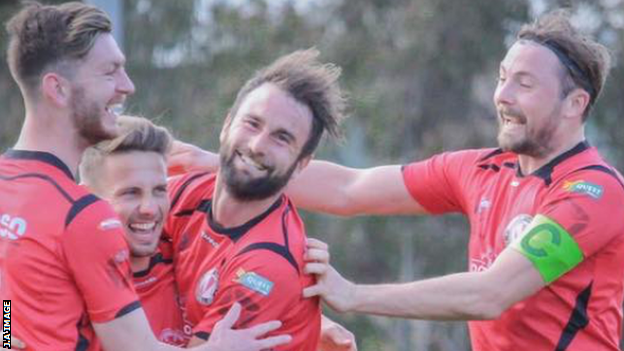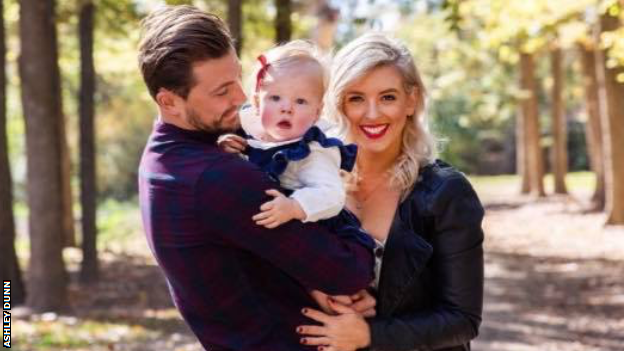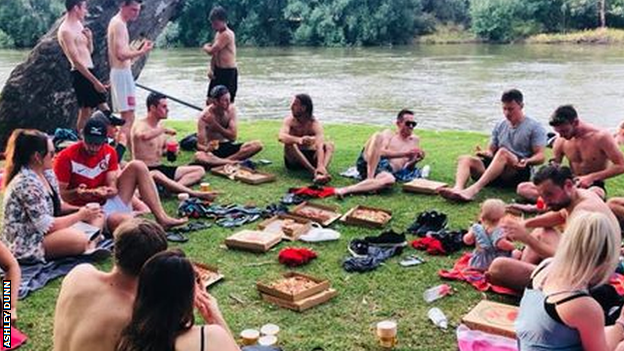Meet the non-league footballers playing in Australia
- Published
- comments

Captain Ashley Dunn won Murray United's players' player of the year at the end of 2018 season
Sun, sea, sand and soccer - is it any wonder almost 50 English footballers are heading out to play in Australia each season?
Beyond the ever-improving A-League, with its small sprinkling of former Premier League players, lies the semi-professional Australian pyramid that is littered with players who have left the likes of Curzon Ashton and Lancaster City to play football down under.
"It's great when you wake up in the mornings and have the clear blue skies in the summer with the beaches not too far away," says Ashley Dunn, a midfielder who is playing in his fourth season in Australian football.
Sounds appealing, but how does it work? And is the lure of warm weather and BBQs on the beach worth the decision to live and play more than 9,000 miles away from family and friends?
Non-league football in England 'was really draining'
Having previously played for Bamber Bridge, Kendal and Skelmersdale among others, Dunn made the move to Wodonga, Victoria to play for newly-formed club Murray United in April 2015.
The 30-year-old, who works in the media industry just as he did in England, finds it much easier combining work, football and family life.
This is particularly important for the footballer, who met his Australian partner Tegan six months into his spell in Victoria, with daughter Milla Rose arriving around 18 months later.

Milla Rose's birth made the local television news
"We play 28 league games a season over here and four or five in the cup," he says. "In England I played 50 or 60 games a season in all competitions, including lots of Tuesday nights.
"I was getting up for work at 6am and getting back from some midweek away games after midnight - it was really draining."
Dunn, who trains with his team twice a week just as he did back home, mainly played in the Northern Premier League while in England (tier seven to eight). He thinks the division he plays in with Murray United - National Premier League Victoria 2 (tier three) - is of a similar standard if not slightly higher.
"The main difference is the physicality for me," says Dunn. "It's not quite as physical over here compared to non-league football in England. There are some good players and teams that play the right way.
"My game has improved over here and I feel it has gone to a different level."
'The bad players are really bad'
Another non-league footballer who had a spell down under was former Salford City man Gary Stopforth.
In January 2017 he left his life in Lancashire for a new adventure in Queensland.
The energetic midfielder, who was playing for Stockport County in the National League North prior to his departure, had a number of options at different levels - he chose Brisbane Premier League team Michelton, who play in the fifth tier of the Australian pyramid. It was a decision he regrets.
"I went to Brisbane as it's sunny all year round," says Stopforth, who appeared on the BBC One documentary, Class of '92: Out of Their League.
"The standard of football wasn't the best, it was similar to North West Counties in England and it got a bit frustrating.
"Don't get me wrong, there were some good players out there but the bad ones were really bad. The organisation and the way things were done at training wasn't what I had been used to either."
One of the biggest difficulties for footballers going over to play in Australia is the distance.
This was something that became even more apparent for Stopforth when his stepfather died three months into his time on the other side of the world.
"It was really, really hard," he says.
"I came back for the funeral and spent about three weeks back in the UK.
"We haven't got a massive family so my mum was a bit lonely. When I got back to Australia I was speaking to her every night and it was very difficult."
Eventually the situation became too tough, with Stopforth's spell in Australia ending with more than two months of the season still remaining.
The fixer
While some players arrange their own deals with Australian clubs, the majority use an agency to help them find a team.
Elliot Livesey is the founder and director of Soccer Smart - a company that has been facilitating the movement of players from England to semi-professional football clubs in Australia since 2010.
"The ones on our books are often seen as marquee players," says Preston-based Livesey, who played non-league football himself.
''As soon as the season finishes my inbox starts to fill up and on average we send across around 50 players a year.
"Some coaches say 'send me the best player you've got' and others say 'give me a left-sided centre back in their mid-twenties'. It really does vary."
Despite often being seen as high-quality signings, the players who do make the move across to Australia don't generally feel the benefit in their wage packets.
"It's almost exactly the same financially but the big thing that sells it to the players is the change of lifestyle," Livesey says.
'I miss the chicken kormas'

The outdoor lifestyle is a big attraction for players moving across to Australia and Murray United's players and families regularly get together.
That change of lifestyle is something Dunn has become accustomed to, but with his two-year working holiday visa now long expired he is relying on other means to stay in Australia.
"My partner is technically sponsoring me but hopefully in the next few years I'll be a permanent resident here," he says.
"Visas can vary from $400 (£214) up to $10,000 or $15,000," he says. "It's not cheap but if you want to live in the country you've got to get your paperwork in place."
For Dunn, living so far away from home for a long spell has been understandably difficult, but modern technology is a great help.
"It's not too bad because you can FaceTime - I try to speak to my family every couple of days through video calls and we've got a family WhatsApp chat going," he says.
As well as his friends and family, there is one other thing that the Murray United captain misses.
"Believe it or not I miss the chicken kormas," laughs Dunn. "They just aren't the same over here and neither are the chippys!"